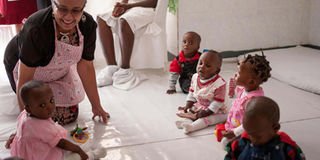Help widows, children in their hour of grief

First Lady Margaret Kenyatta at the Imani Children's Home. No child should be forced by their own relatives to endure poverty and unnecessary lifelong lessons with far reaching consequences.
PHOTO | FILE | NATION MEDIA GROUP
What you need to know:
For far too long, children have been a secondary issue when it comes to matters concerning widows.
We have come of age as a society to let patriarchy cause damage to children of widows.
While we might not wholly get rid of patriarchy overnight, let us take all reasonable measures to avoid consequential long-term harm to children, after they suffer one of the greatest losses in life.
Tomorrow we mark the International Widows Day. The UN estimates there are 258 million widows around the world and one in ten lives in extreme poverty. A wife and her children tend to suffer the same consequences after the loss of a husband and father — eviction from the family home, denial of their inheritance and being shunned by the family, among others. Prima facie, these consequences seem to hit the wife hard, but on closer reflection, the hardest hit is the child.
The pain and loss of a father is no longer all that a child grapples with. Overnight, young children are transformed into young adults and forced into child labour to assist their mother cover the lost income from their father.
Where money is still lacking, some children are forced into child prostitution while others take up crime to fend for themselves. The children no longer witness the physical abuse of their mother by male relatives staking their claim; they too are subjected to the same treatment. Completing school or college is no longer guaranteed.
In the long-term, that child’s outlook in life is influenced by the actions of their own flesh and blood. The child lost their childhood to premature adulthood and there is no do-over to make fond childhood memories. They will never know what it truly means to be a free-spirited child with little care in the world, not at the mercy of ill-meaning exploitative adults.
And since every action has a reaction, that child will grow up bitter and resentful, some perpetuating the abuse they witnessed and faced. Others will be at the end of the spectrum swearing off relationships or marriages, while a number will experience the same abuse their mother faced never realising this was never normal. In this darkness and turmoil against all odds, some will excel and break the poverty cycle.
Losing a parent will test you. Nevertheless, no child should be forced by their own relatives to endure poverty and unnecessary lifelong lessons with far reaching consequences. At the point of their father’s death they were children, and the relatives may have dismissed the impact of their action as such, but children see, hear and remember. To the purist relative, this was a matter of land and assets, yet the child paid the highest price growing up.
For far too long, children have been a secondary issue when it comes to matters concerning widows. They are never the centre of discussions when they lose their father. Everybody cowers to the mother chasing after the property, seldom checking on the health and well-being of the children.
They might be small, but they are still human beings that need nurturing now more than ever in their grief, to minimise the impact of their loss. Never should a child be left out in the cold as soon as the father is buried. Rather, let every decision made be in the best interest of the child.
We have come of age as a society to let patriarchy cause damage to children of widows. While we might not wholly get rid of patriarchy overnight, let us take all reasonable measures to avoid consequential long-term harm to children, after they suffer one of the greatest losses in life.
The writer focuses on children’s issues; [email protected]





